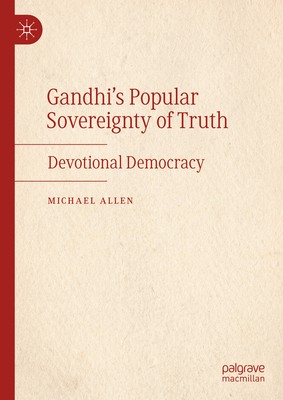
- We will send in 10–14 business days.
- Author: Michael Allen
- Publisher: Palgrave Macmillan
- ISBN-10: 3031881257
- ISBN-13: 9783031881251
- Format: 14.8 x 21 x 1.4 cm, kieti viršeliai
- Language: English
- SAVE -10% with code: EXTRA
Reviews
Description
This book offers a philosophical reconstruction of Gandhi's political thought as form of devotional democracy in which the sovereign people speak the voice of Truth as God's voice.
Part One defines the concept of a devotional democracy and addresses Gandhi's relationship to the history of modern Western political thought, and key thinkers such as Hobbes, Locke, and Hegel.
Part Two explores the concept of a Gandhian devotional democracy in relation to contemporary political thought and decidedly illiberal thinkers, such as Ivan Ilyin and Curtis Yarvin, as well as contemporary trends including populism, traditionalism, along with important developments like AI superintelligence and interspecies politics.
The book aims not only to locate Gandhi in the historical context of modern and contemporary political philosophy but also demonstrate the potential for his political thought to undergo sympathetic constructive reinterpretation. It encourages readers to reassess and rethink the role of soul force over coercive state force and a national people's capacity to realize Truth devotionally.
EXTRA 10 % discount with code: EXTRA
The promotion ends in 22d.07:11:30
The discount code is valid when purchasing from 10 €. Discounts do not stack.
- Author: Michael Allen
- Publisher: Palgrave Macmillan
- ISBN-10: 3031881257
- ISBN-13: 9783031881251
- Format: 14.8 x 21 x 1.4 cm, kieti viršeliai
- Language: English English
This book offers a philosophical reconstruction of Gandhi's political thought as form of devotional democracy in which the sovereign people speak the voice of Truth as God's voice.
Part One defines the concept of a devotional democracy and addresses Gandhi's relationship to the history of modern Western political thought, and key thinkers such as Hobbes, Locke, and Hegel.
Part Two explores the concept of a Gandhian devotional democracy in relation to contemporary political thought and decidedly illiberal thinkers, such as Ivan Ilyin and Curtis Yarvin, as well as contemporary trends including populism, traditionalism, along with important developments like AI superintelligence and interspecies politics.
The book aims not only to locate Gandhi in the historical context of modern and contemporary political philosophy but also demonstrate the potential for his political thought to undergo sympathetic constructive reinterpretation. It encourages readers to reassess and rethink the role of soul force over coercive state force and a national people's capacity to realize Truth devotionally.


Reviews